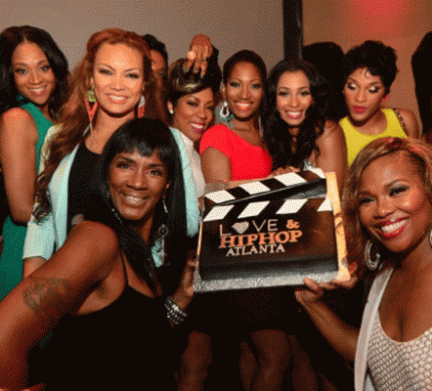[Dysfunctional] Love and Hip Hop: Reality TV’s Distortion of Black Relationships
[ Dysfunctional] Love and Hip Hop: Reality TV’s Distortion of Black Relationships
Dysfunctional] Love and Hip Hop: Reality TV’s Distortion of Black Relationships
So, I was not quite sure how I wanted to begin my first post nor was I sure what aspect of hip hop I wanted to address first. After thinking about Rose’s article on Dysfunctional Ghetto Culture, I decided to address the dysfunctional images being presented by our media and popular culture through reality TV. I had been roughly keeping up with this year’s season of VH1’s reality show “Love and Hip Hop: Atlanta” which showcases various artists that either were, currently are, or are aspiring to be a part of the hip hop industry. The cast includes producer and talent manager Stevie J, Mimi Faust (the mother of his child), Joseline Hernandez (an aspiring artist under Stevie J), singer K.Michelle, rapper Rasheeda and her husband Kirk, Benzino former rapper and hip hop entrepreneur, rapper Lil Scrappy, his ex-girlfriend Erica, his mother and “friend in waiting” Shay (former “Flavor of Love” participant as well), as well as aspiring artist Karlie Red. The show’s purpose, I’m assuming that there was one, was to show how the culture of hip hop effects the everyday lives of these people who are a part of it. The only problem with this concept was that there was no true reality shown to the people who were supposed to be gaining the insight.
The culture of violence, and sexual deviance and excess that Rose discusses in the beginning of her article are highly glamorized in this reunion show as well as throughout the season itself. Her argument that these behaviors (among others) are imbedded in people’s minds to the point where they believe it is okay or “normal” to interact, think, or behave in certain ways. The first image that I identified as not only stereotypical but frighteningly becoming more real is the one Joseline is used to portray. Seeing her sit on the stage in front of cameras broadcasting to millions saying of her career manager “I use him for his sex and his money” not only speaks volumes about how she views herself as well as how she views men. The image of black men only being equated to the amount of material wealth they have as well as their sexual organs reminds me of the same stereotype black men were subjected to during slavery. Men (and black women too) being “tagged” with a monetary value and then being told the only thing they are good for is their bodies, is how many females are beginning to view themselves today. The fact that the relationship between Stevie J, Joseline and Mimi is so attractive to people blows my mind because it makes it seem to the public that black women expect and accept infidelity in relationships. In the case of Joseline, she presents the image that some black women believe they deserve nothing more than to be cheated on in relationships.
I do not want to make it seem like I’m only criticizing the women so in the case of Stevie J, he represents the image of the hurt young black man. The one who felt like he didn’t get enough love from his mother and therefore takes it out on other women. His flaw in this situation is that he refuses to admit that his actions towards women does reflect his true feelings about women. This refusal speaks to Rose’s point that “behaviors that seem to be understandable . . . responses to a given situation . . . become a black cultural problem . . . generated entirely by black people” (p70). This relates to Stevie’s case because he represents the image of the scorned unfaithful black man as well as many resentful women’s reason to not trust black men. It could even be seen as the some scorned women’s reasoning for only viewing men superficially to avoid being emotionally hurt by men like Stevie’s actions.
This mistrust and clash of stereotypes is also seen in Lil Scrappy and Erica’s love triangle with Shay. In the case of Erica and Shay, there is an image created that reinforces the stereotypical idea that black women can not get along and the reason is because of lying black men. Although we all should know that it is not fair nor is it smart to make a broad assumption about a group of people, in my personal experience I have heard women say that they would not be in a relationship with a black man period because they already know that they are going to lie or cheat or get into some kind of trouble. The one issue that I had with Scrappy and Erica’s relationship was the fact that he addressed he a lot as “baby mama” and the show portrayed the both of them as reinforcement that you do not have to be present to be an effective parent. This is what I believe is internalized under the nonsense despite the many critiques and studies showing the benefits of two parent homes or upbringings. Rose notes that this is a recurring issue in the black community that remains a common trend in hip hop music and culture. Though I could say more about the show, I decided to add the Vh1 link to the second part of the reunion (I had already seen the first part which wasn’t much better content wise) so that you all can make your own conclusions. Please share any thoughts you may have about this show, another reality show, or anything.

Trackbacks / Pingbacks